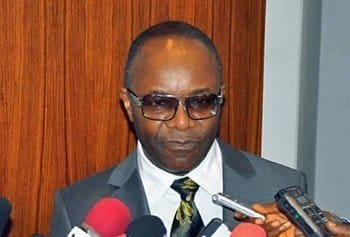THE Nigerian National Petroleum Corporation (NNPC), on Tuesday, dissociated itself from the misappropriation of $13 billion paid as dividends by the Nigeria Liquefied Natural Gas (NLNG) in 2013 into its coffers, saying both corporations belong to the Federal Government.
This was in reaction to the 2013 audit reports of the Nigeria Extractive Industries Transparency Initiative (NEITI), which revealed that about $13 billion was remitted to the NNPC by the NLNG as dividends at the end of 2013.
The Group General Manager, Debt Office of the NNPC, Mr Godwin Okonkwo, made this clarification, while speaking with newsmen at stakeholders` dialogue on the 2013 NEITI Oil, Gas and Solid Minerals reports held at NAF Conference Center, Kado, Abuja.
According to him, “you can’t just wake up and start transferring money to anybody, as I said before, NLNG belongs to the Federal Government and if the Federal Government asks for the money, NNPC will properly gives it. You can’t just wake up and start transferring money to state or federation, it based on authority, but NNPC has aligned with the directive of current regime.”
He stressed that everything did during the year under review was done with appropriate approval, especially in related to funds of NLNG and other gas related projects, as the balance was transfered from TUC to Central Bank of Nigeria (CBN), as nothing was left without appropriate approval.
The audit reports, however, further indicated that the NNPC and its sub units owed the federation a total of $3.787 billion and N358.3 billion outstanding revenue respectively.
Presenting the highlights of the report, the Executive Secretary, NEITI, Mr Waziri Adio, said the confusion on whether the NLNG belongs to the Federal Government or the Nigerian Petroleum Development Company (NPDC) has resulted to a situation where the NPDC enjoyed all the proceeds of the assets without remitting anything to the federation.
The reports, therefore, recommended that there was need for NNPC, DPR, FIRS, OAGF and CBN to prioritise fixing remedial issues identified in their operations, as a way of avoiding the huge loss of revenue from NNPC and other organisations.
“There should be an investigation into the divestments of federation assets by NNPC to NDPC. Pricing methodology should be resolved through the enactment of appropriate law to forestall under assessment of Petroleum Profit Tax (PPT) and royalties.
“Gas should be invoiced in dollars, not naira to avoid exchange losses as well as NNPC refunding the outstanding revenues owed, read some of the recommendations of the report as a means of avoiding revenue loss.
“An investigation into the status of the NLNG dividends and the NNPC abiding by the Federal Government financial regulations and laws which gives a 90-day credit period would help forestall the losses.
But stakeholders were convinced that the security agencies should have commenced prosecution of organisations found culpable by the report.
The Executive director, African Centre for Leadership Strategy and Development, Mr. Otive Igbuzor said : “we expect that security agencies represented here should have told us how far they have gone with prosecuting organisations found culpable or what they are doing to ensure that the funds are returned”.
“Timeliness of NEITI report has been a concern to expert who said the report as been belated. As a board, we have resolved to seek necessary support to make the reports more regular as well as generate other knowledge products to keep issues of transparency and accountability on the front burner for policy makers and citizens alike”, said Kayode Fayemi, NEITI board chairman and Minister of Solid Minerals Development.
Represented by member of the national working group of NEITI, Lawan Garba, representing North East in group, the chairman explained that the report was necessary as it aimed at tackling the challenges of resource curse in resource rich nations like Nigeria.
“Resource curse afflicts a country when the abundance of natural resource creates a negative incentive to concentrate economic activity on the exploitation of minerals at the expense of productive sectors”, he added.











